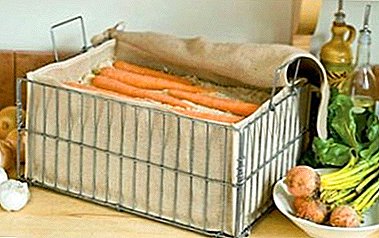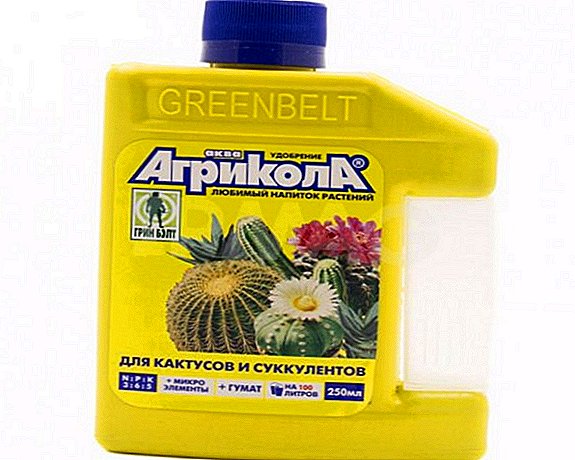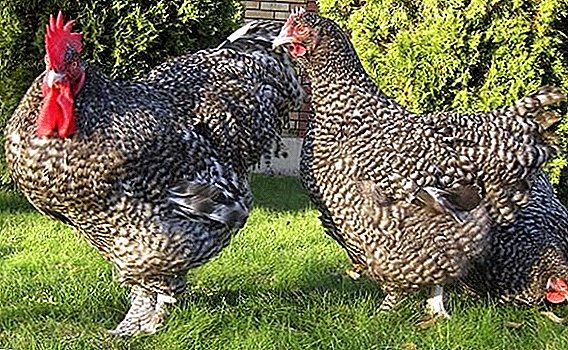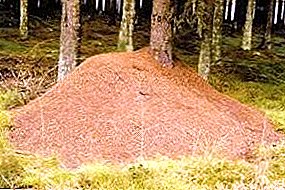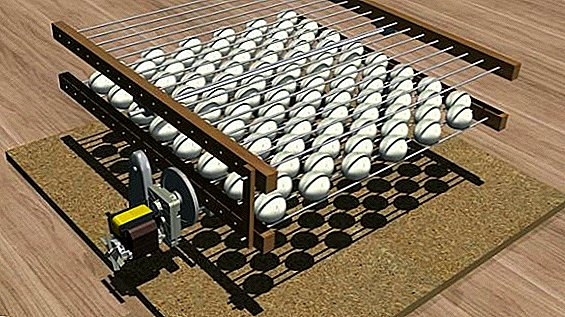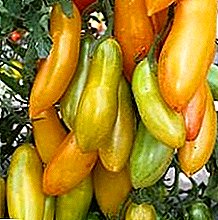 In the diet of rabbits, juicy fruits do not occupy a central place, but during the fruit and berry period, fresh fruits well replenish the menu of animals. Many rabbit breeders feed in trimming and peeling. However, not everyone knows whether it is possible to give the rabbits melon and its crusts, from what age and in what quantities.
In the diet of rabbits, juicy fruits do not occupy a central place, but during the fruit and berry period, fresh fruits well replenish the menu of animals. Many rabbit breeders feed in trimming and peeling. However, not everyone knows whether it is possible to give the rabbits melon and its crusts, from what age and in what quantities.
Can rabbits
Melon, like all other juicy food, is hard digested by the rabbit's digestive system, as it contains little dietary fiber (0.9 g per 100 g of melon). Fibers contribute to the promotion of food through the intestines, so fibrous food is the basis of the diet for these animals.  But the melon and other juicy fruits should be given a little. They can cause flatulence or indulgence of the intestines, but can be useful for an animal with constipation. In no case can not give rotten or acidified fruit.
But the melon and other juicy fruits should be given a little. They can cause flatulence or indulgence of the intestines, but can be useful for an animal with constipation. In no case can not give rotten or acidified fruit.
Did you know? 100 g of melon contains 90 g of water, 7.4 g of carbohydrates, 0.9 g of dietary fiber, 0.6 g of proteins and 0.3 g of fat. It contains vitamins (C, A, E, PP, vitamins of group B) and minerals (iron, potassium, cobalt, magnesium, phosphorus, iodine, etc.) necessary for the normal functioning of the body.
Melon
Delicious and sweet melon pulp may please rabbits and become their favorite delicacy, but some individuals may not want this treat. It is best to give this juicy product along with hay or other fibrous food.
Also find out if rabbits can be given grapes, bread, rice and cherry branches.
Melon crusts
Rabbits can be given melon peels. You can eat the sweet flesh yourself, leaving harder rinds as treats for the rabbit. They also contain vitamins, and fiber, which people do not like, makes them a more acceptable product for the digestion of rabbits than pulp.  It should be borne in mind that it is in the peel and near it that nitrates and other chemicals are concentrated, which were used to grow and process fruits. Therefore, it is safer to use melon from your garden, as rabbits are very sensitive to toxic substances.
It should be borne in mind that it is in the peel and near it that nitrates and other chemicals are concentrated, which were used to grow and process fruits. Therefore, it is safer to use melon from your garden, as rabbits are very sensitive to toxic substances.
Feeding rules
Melon is an acceptable, but heavy product for the gastrointestinal tract of rabbits, so it is very important to give it correctly.
Important! If the rabbit shows signs of indigestion or abdominal distention, this product is excluded from the diet. In addition, measures are being taken to improve digestion, as bloating can be dangerous for a pet.
From what age can
A melon can be given to a rabbit when its digestive system is ripe and works without fail. If the young do not have any digestive problems, they can begin to give this fruit from the age of four months. At first, it is necessary to give a very small piece and follow the state of the animal - how it was defecated, if the stomach was not pouting. 
How to give
Feed the rabbits melon can be no more than 1-2 times a week. You can not give her pulp and peel several times in a row, they should be alternated with other juicy fruits and vegetables. When a melon is given to rabbits, it is given only to it, since the simultaneous use of several types of juicy fruits is contraindicated for these animals. Melon crusts should be prepared for consumption as feed in the following way:
- wash well under running water;
- cut off the upper hard pelt;
- cut into small pieces;
- let it dry.
Melon harvesting and storage in winter
It is most useful to feed fresh melons and their rinds to the rabbits in season. However, these fruits can be preserved for a long time - freeze or dry.
Important! Melon is not stored on the shelf of the refrigerator. If to wrap the uneaten slices in a bag and put them in the refrigerator, toxic ethylene harmful for the health of rabbits will be released within 24-28 hours.
You can save the harvest of melons before the New Year, observing the following conditions:
- late varieties with a long growing season and dense flesh are chosen for winter storage (“Wintering”, “Slavia”, “Torpeda” and others);
- fruits should be chosen slightly unripe, with a light, soft grid and elastic spout;
- they should not be damaged;
- storage room should be dark and well ventilated;
- the best temperature for storing this melon culture is 2-4ºС, humidity - 80%;
- fruits can be stored hanging in a net, placed in boxes of sand (sawdust, grain), on shelves with bedding made of straw, covered with sacking;
- must be stored separately from other fruits and vegetables.
 Early varieties are stored no more than a month, and the maximum storage period of medium ripeness is up to three months. Melon flesh or its peeled crusts can be prepared for the winter, cut into small pieces and dried on a quiet fire in the oven or using an electric dryer. If the weather allows, you can dry it in natural conditions, cutting it into thin strips and hanging it on a thick saw in a room with good ventilation for two weeks.
Early varieties are stored no more than a month, and the maximum storage period of medium ripeness is up to three months. Melon flesh or its peeled crusts can be prepared for the winter, cut into small pieces and dried on a quiet fire in the oven or using an electric dryer. If the weather allows, you can dry it in natural conditions, cutting it into thin strips and hanging it on a thick saw in a room with good ventilation for two weeks.Contraindications and harm
The digestive organs of rabbits hardly digest berries and fruits. Therefore, for a product like melon, there are certain contraindications:
- diarrhea and any disorders of the digestive system;
- abdominal distention;
- infectious diseases and invasions;
- pregnancy and lactation - during this period it is better to change the melon for carrots or apples, but in strictly limited quantities;
- rabbit up to 2.5 months can not give juicy fruits; Additives are introduced into food, starting with apples or pears, because they are not as heavy as melon - but it should be given after 4 months.
Important! The smaller the rabbit is, the smaller the melon should be. So, representatives of decorative dwarf breeds should be given very small pieces so as not to provoke indigestion.
What else can feed the rabbits
In food, rabbits can add the following food:
- Green food. First of all, it is fresh grass and garden greens. Such food is eaten from early spring to late autumn, as it has many vitamins and substances necessary for the growth and development of animals. Freshly cut grass is recommended for a bit of sunning. Good herbs such as wormwood, dill, chicory, yarrow.

- Rough feed. Hay is the basis of the entire diet of rabbits. In addition to it, you can give straw, twigs of trees and shrubs. Dried meadow grasses such as clover, alfalfa, chamomile, jellyfish, yarrow and others are well suited for hay. Small twigs are taken from birch, linden, aspen, maple, poplar, hornbeam, willow, cornel, pear, apple, etc.

- Succulent feed. It contains a lot of water, so it is easily digested and recycled by the body. It contains many vitamins, minerals, carbohydrates, as well as fiber, vegetable fats, proteins. Such feeds include beets, potatoes, pumpkins, carrots, zucchini, Jerusalem artichokes, watermelon, cabbage, other vegetables and fruits, and silage. From fruits, apples and pears are best. Some cleaning and waste products are also suitable for feed. Rabbits can be given peeling potatoes, cabbage leaves, and watermelon peels.
- Concentrated feed. They include cereals (oats, wheat, barley, corn), legumes, waste (bran, meal, cake) and additives from meat-bone or fish meal. In their composition, they contain many calories, proteins, minerals, but few vitamins, so vitamins, minerals and sometimes prophylactic agents for diseases (antibiotics, other medicines) are added to a balanced food for eared fish.
Did you know? For one adult rabbit, it is necessary to do hay harvesting for the winter weighing approximately 40 kg, for young individuals up to 5 months old - 10-15 kg. This animal for one feeding can eat the volume of grass, commensurate with a large pillow.
Melon and its crusts can be given to rabbits only as a treat, alternating their intake with other vegetables or fruits. It is heavily digested by the digestive system and has contraindications. Enter it into the diet should be carefully, all the while watching the reaction of the organism. If everything is in order, this product can be fed in the summer or procured for the winter.






